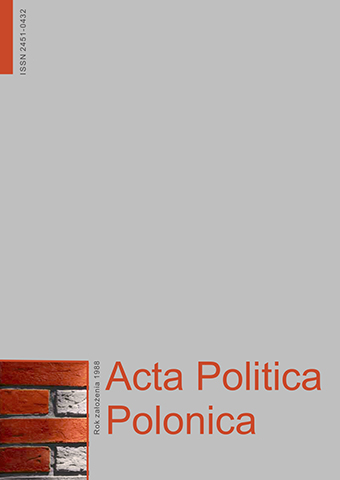
ISSN: 0867-0617
OAI
DOI: 10.18276/ap.2015.31-02





Issue archive /
1/2015 (31)
The Flexible Integration in the European Integration Process. Selected Issues
| Authors: |
Elżbieta
Lesiewicz
Uniwersytet im. Adama Mickiewicza, Wydział Nauk Politycznych i Dziennikarstwa, Zakład Najnowszej Historii Politycznej |
| Keywords: | European Union integration process flexible integration the Multi-Speed European Union Á la Carte Europe Variable-Geometry Europe |
| Data publikacji całości: | 2015 |
| Page range: | 18 (27-44) |
Abstract
After the Second World War the question of the unified Europe became the central point of attention. However, it has been a difficult (sometimes even impossible) task to develop and implement a common concept concerning the integrity of Europe. Over the years, the intensification of integration processes and an increase in the number of the EU members states have diversified the Union’s structure as well as enhanced its internal diversity. In such circumstances, the application of the flexible integration concept, defined as one of the EU basic principles, became crucial. The flexible integration elements were introduced to the primary law in the form of an enhanced cooperation mechanism relatively late, namely via the Treaty of Amsterdam. Nevertheless, the European initiatives in which not all of the member states took part (for instance, the Schengen Agreement. or the Economic and Monetary Union) already existed. In the current considerations attention is drawn to the fact that certain forms of “flexibility” existed since the beginning of the integration process and continued through the subsequent stages of the Union’s broadening and deepening; the developments which, to an extent, facilitated the acceptance of the flexible solutions. Although the flexibility policy is inconsistent with the European integration paradigm, it has accompanied this process since the beginning and is now vital for its continuation of the integration process. The issue of the flexible integration fits well in between two competing theoretical concepts – these of federalism and intergovernmentalism – whose theoretical approaches recognise and respect the diverse European reality.
Download file
Article file
Bibliography
| 1. | Barcz, Jan. “Międzyrządowe obszary współpracy w UE – II i III filar UE”. Integracja Europejska. Ed. J. Barcz, E. Kawecka-Wyrzykowska, K. Michałowska-Gorywoda. Warszawa: Wolters Kluwer 2007. |
| 2. | Bokajło, Wiesław (ed.). Federalizm. Teorie i koncepcje. Wrocław: Wydawnictwo Uniwersytetu |
| 3. | Wrocławskiego 1998. |
| 4. | Borkowski, Paweł Janusz. „Federalizm a budowanie jedności Europy.” Studia Europejskie No. 2, 2006. |
| 5. | Borkowski, Paweł Janusz. Międzyrządowość w procesie integracji europejskiej. Warszawa: Oficyna Wydawnicza Aspra 2013. |
| 6. | Czachór, Zbigniew. Zmiany i rozwój w systemie Unii Europejskiej po Traktacie z Maastricht. Wrocław: Alta2 2004. |
| 7. | Commissariat Général du Plan. L’Europe les vingt prochains années. La Documentation Française 1980. |
| 8. | Dahrendorf, Ralf. A Third Europe? Third Jean Monnet Lecture by Professor Ralf Dahrendorf, Director of the London School of Economics. Florence,26 November 1976. Archive of Europen Integration, http://aei.pitt.edu. Accessed: 15.01.2015. |
| 9. | Dewatripont, Mathias, Francesco Giavazzi, Jurgen Von Hagen, Ian Harden, Torsten Persson, |
| 10. | Gerard Roland, Howard Rosenthal, Andre Sapir, Guido Tabellini. Flexi-ble Integration. Towards a More Effective and Democratic Europe, London: Centre for Economic Policy Research 1995. |
| 11. | Glaster, Jan, Paulina Justyńska, Marek Kolasiński, Katarzyna Witkowska-Chrzczonowicz, Zbigniew Witkowski (eds.). Podstawy prawa Unii Europejskiej. Toruń: Towarzystwo Naukowe Organizacji i Kierownictwa „Dom Organizatora” 2006. |
| 12. | Hambura, Stefan, Mariusz Muszyński. Traktat o Unii Europejskiej z komentarzem. Bielsko-Biała: Wydawnictwo Studio Sto 2001. |
| 13. | Junge, Kerstin. “Integracja zróżnicowana”. Unia Europejska, organizacja i funkcjonowanie. Ed. M. Cini. Warszawa: Polskie Towarzystwo Ekonomiczne 2007. |
| 14. | Kinsky, Ferdinand. Federalizm model ogólnoeuropejski. Kraków: Wydawnictwo WAM 1999. |
| 15. | Kinsky, Ferdinand. Federalism – A Global Theory. The Impact of Proudhon and the Personalist Movement on Federalism. Nice: Presses d’Europe 1995. |
| 16. | Konopacki, Stanisław. „Dylematy federalizmu europejskiego.” Studia Europejskie No. 4, 1998. |
| 17. | Konopacki, Stanisław. „Od Europy ‘á la carte’ do ‘integracji elastycznej’.” Przegląd Politologiczny |
| 18. | No. 3–4, 1998. |
| 19. | Kowalski, Jerzy, Zenon Ślusarczyk. Unia Europejska. Proces integracji i zarys problematyki instytucjonalno-prawnej. Poznań: PWP Iuris 2006. |
| 20. | Krasuski, Jerzy. Europa Zachodnia. Dzieje polityczne 1945–1993. Warszawa: WSiP 1995. |
| 21. | Łastawski, Kazimierz. Historia integracji europejskiej. Toruń: Wydawnictwo Adam Marszałek 2006. |
| 22. | Łukaszewski, Jerzy. Cel: Europa. Dziewięć esejów o budowniczych jedności europejskiej, Warszawa: Nor sur Blanc 2002. |
| 23. | Mouffe, Chantal. „Przyszłość Europy podejście agonistyczne.” Krytyka Polityczna Nr 34, 2013. |
| 24. | Popowicz, Krzysztof. Historia integracji europejskiej. Warszawa: Szkoła Główna Handlowa 2006. |
| 25. | Ruszkowski, Janusz. Wstęp do studiów europejskich. Warszawa: Wydawnictwo Naukowe PWN 2007. |
| 26. | Schuman, Robert. Dla Europy. Kraków: Znak 2009. |
| 27. | Stubb, Alexander. „Categorization of Differentiated Integration.” Journal of Common Market Studies Vol. 34, No 2, 1996: 283–295. |
| 28. | Szwarc, Monika. Zróżnicowana integracja i wzmocniona współpraca w prawie Unii Europejskiej. Warszawa: Wydawnictwo Prawo i Praktyka Gospodarcza 2005. |
| 29. | Szymczyński, Tomasz. „Modelowe założenia zasady oraz próba kategoryzacji.” Unia Europejska po traktacie Nicejskim. Ed. Z. Czachór. Warszawa: UKiE 2002. |
| 30. | Wallace, Helen, Adam Ridley. Europe: The Challenge of Diversity. London 1985. |
| 31. | Woźniak, Wiesława. „Kompromis jako wartość w sferze publicznej.” Strefa publiczna. Konfrontacja – przejawy – przemiany. Ed. J.P. Hudzik, Wiesława Woźniak. Lublin: Wydawnictwo UMCS 2006. |
| 32. | Zięba, Ryszard, Wspólna Polityka Zagraniczna i Bezpieczeństwa Unii Europejskiej. Warszawa: WAiP 2007. |